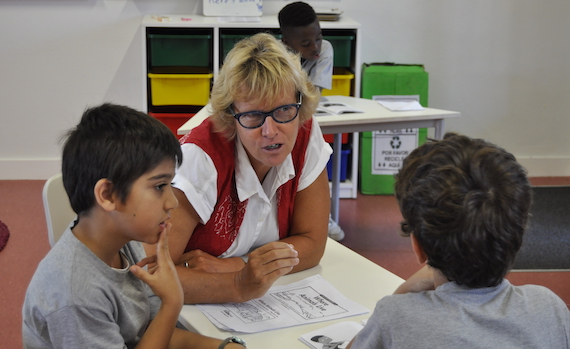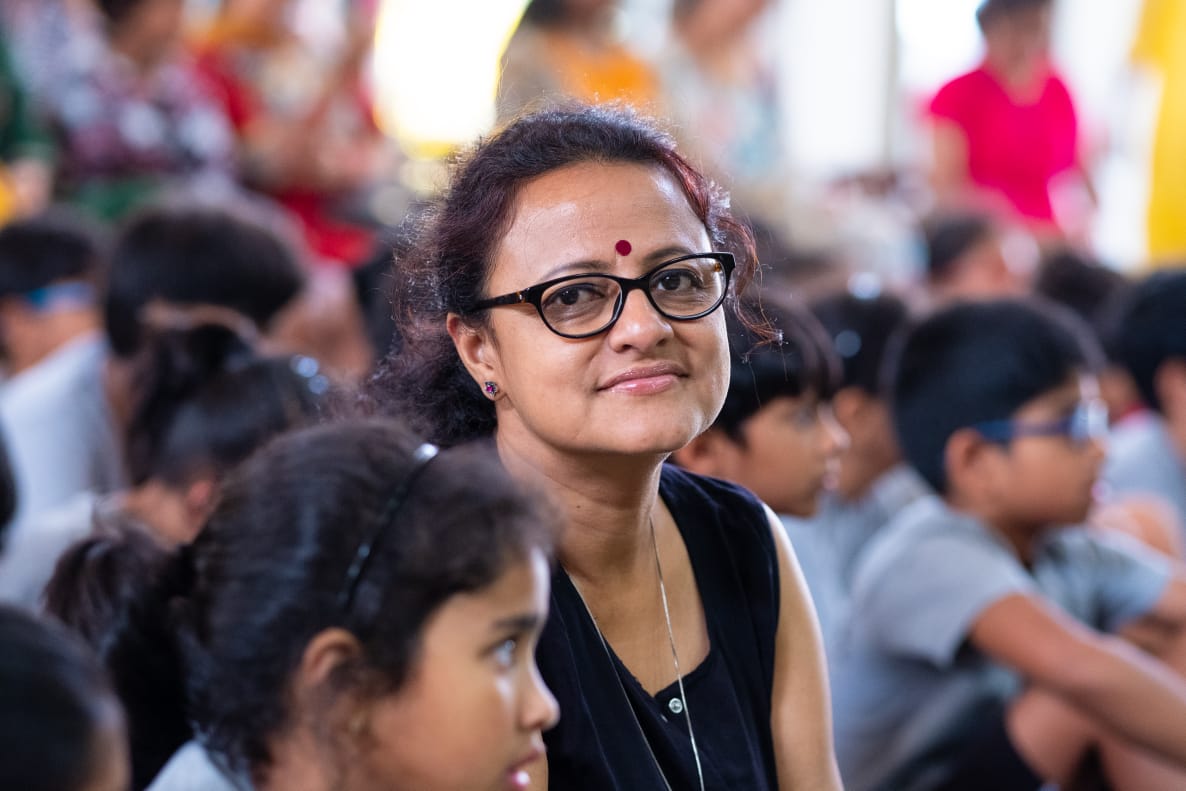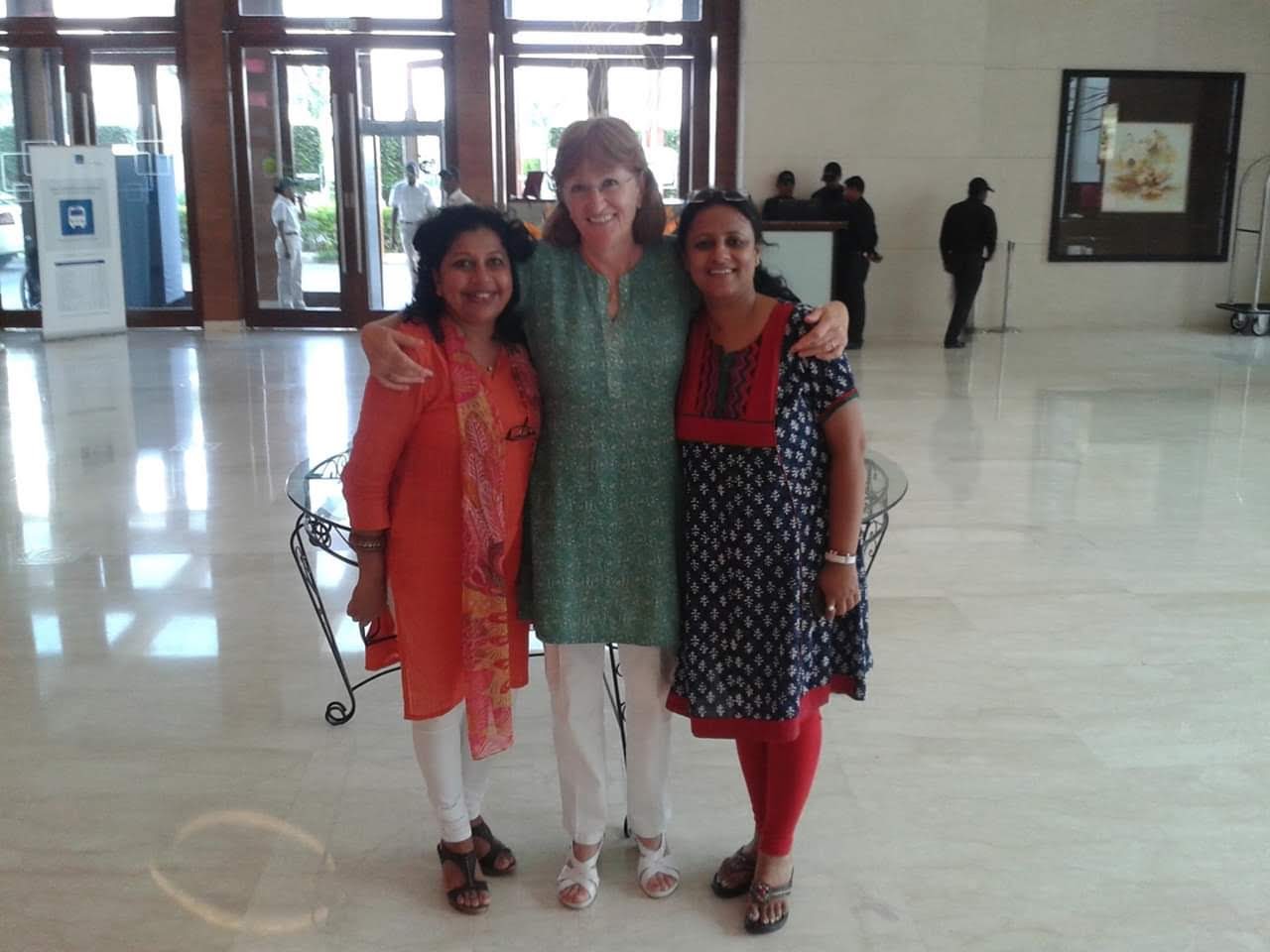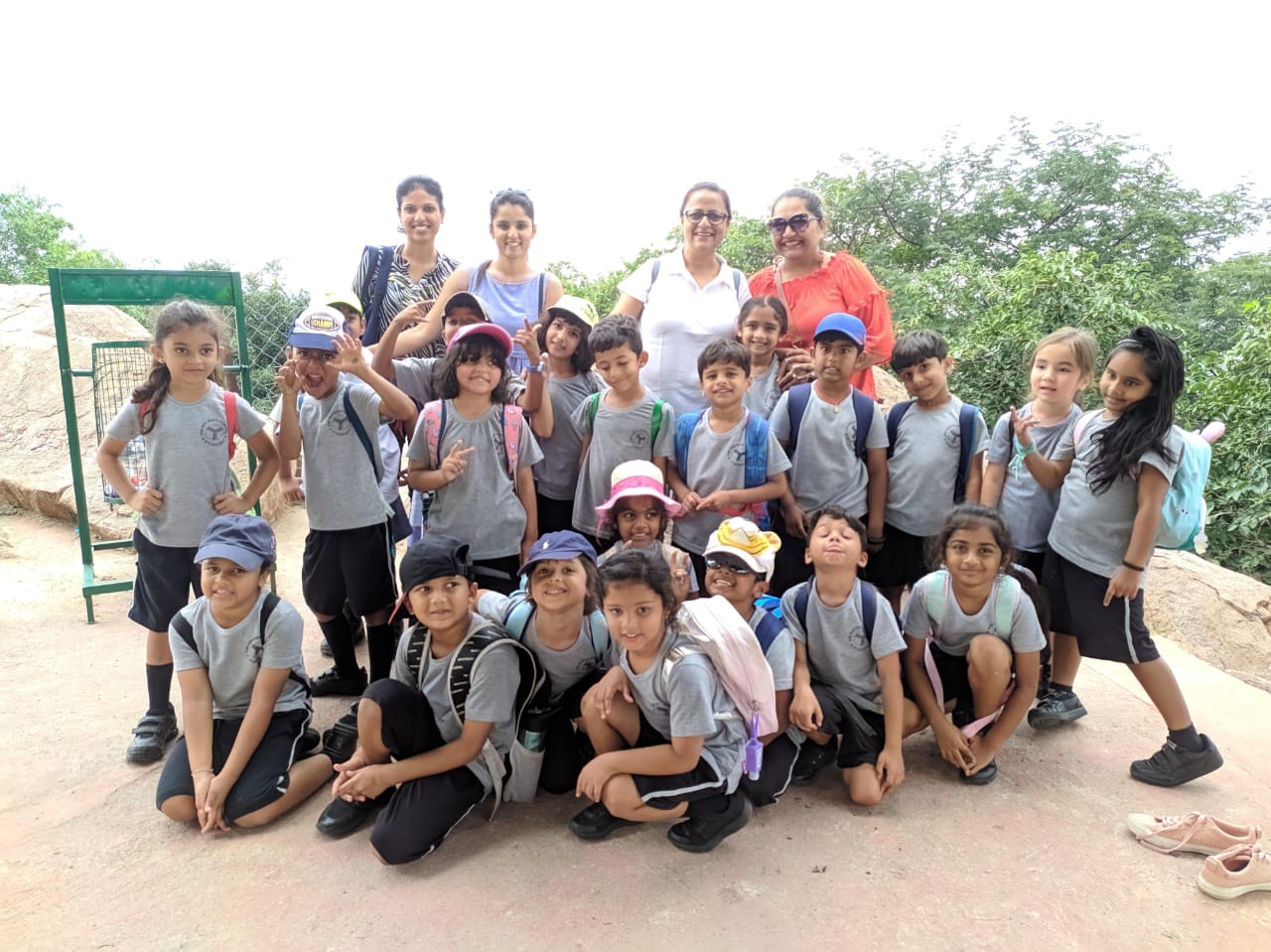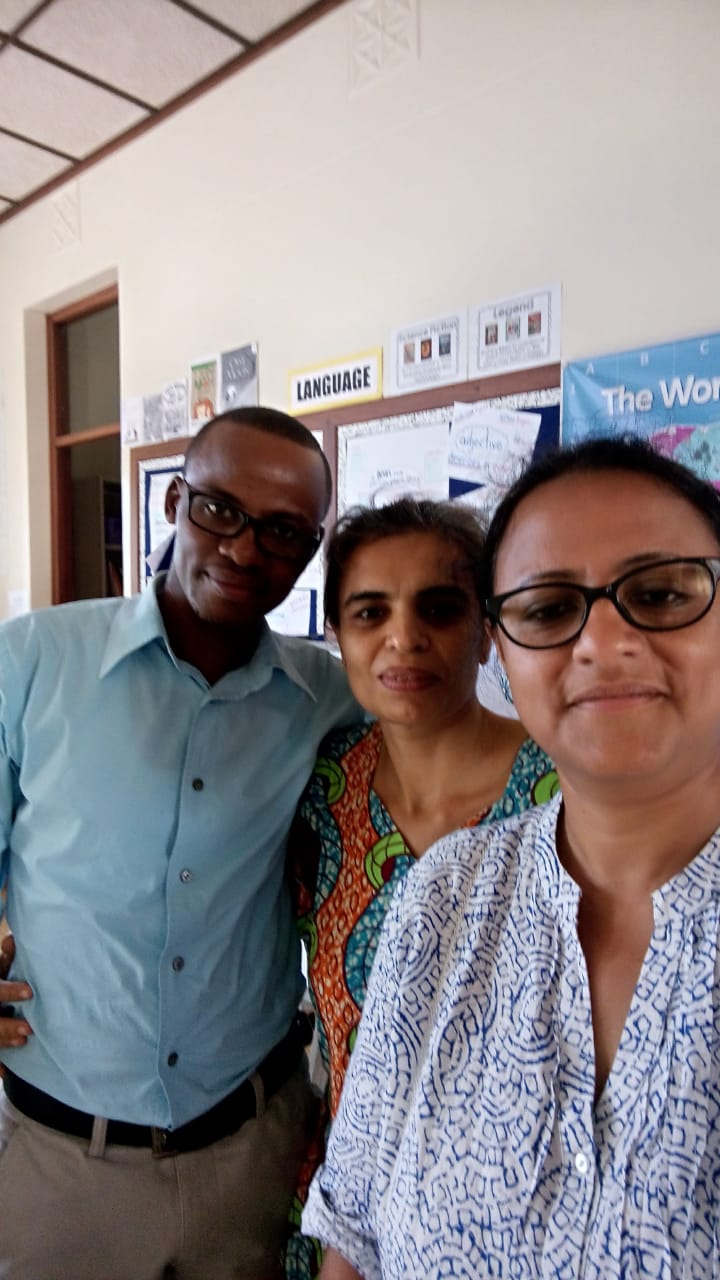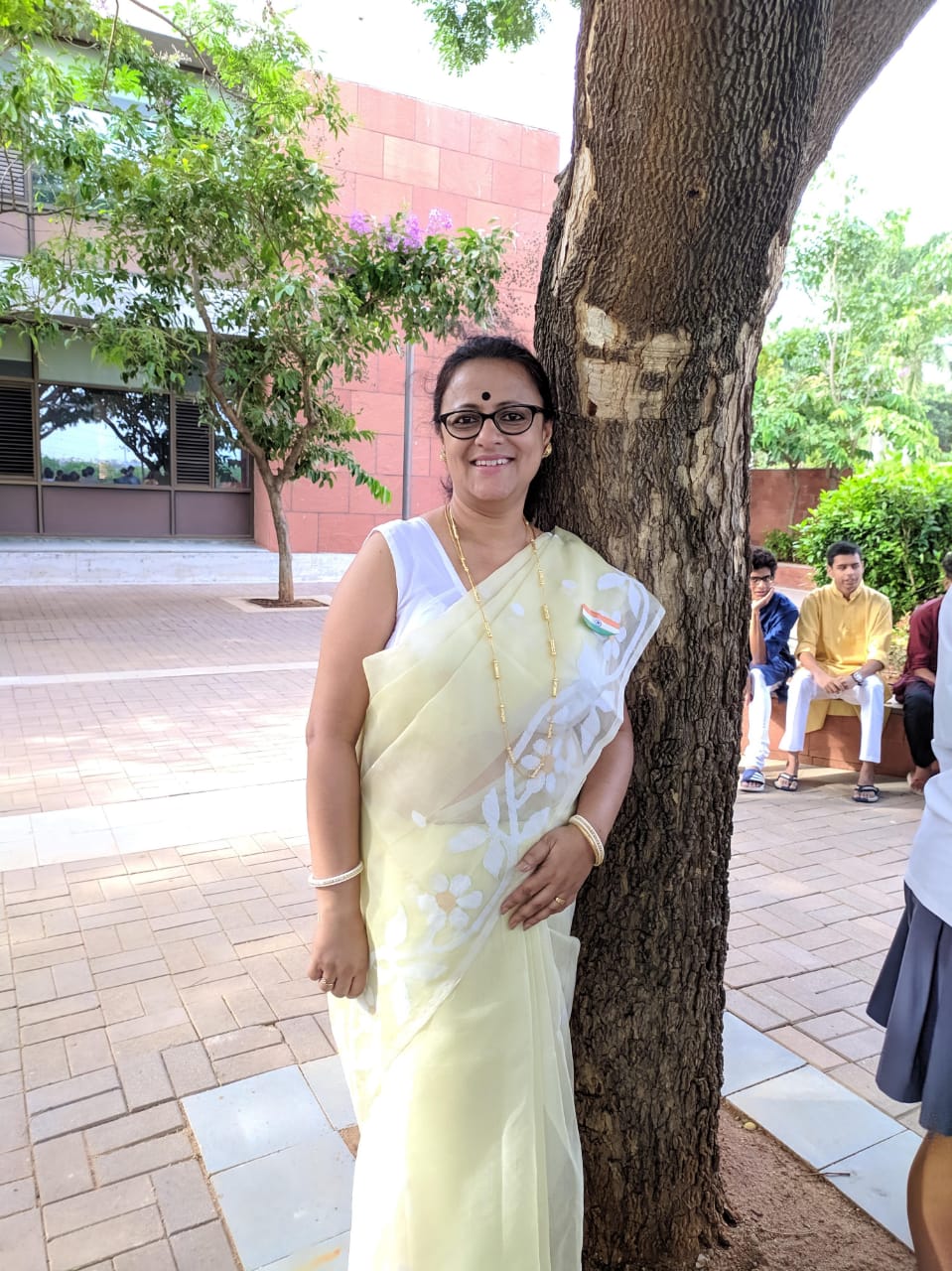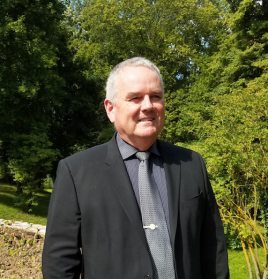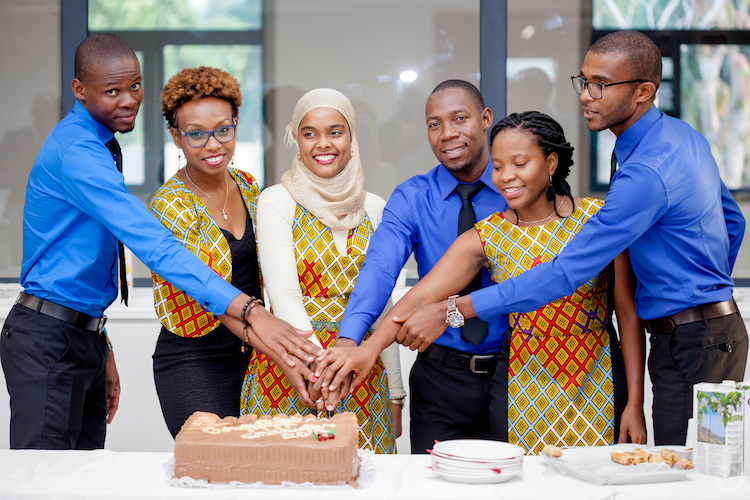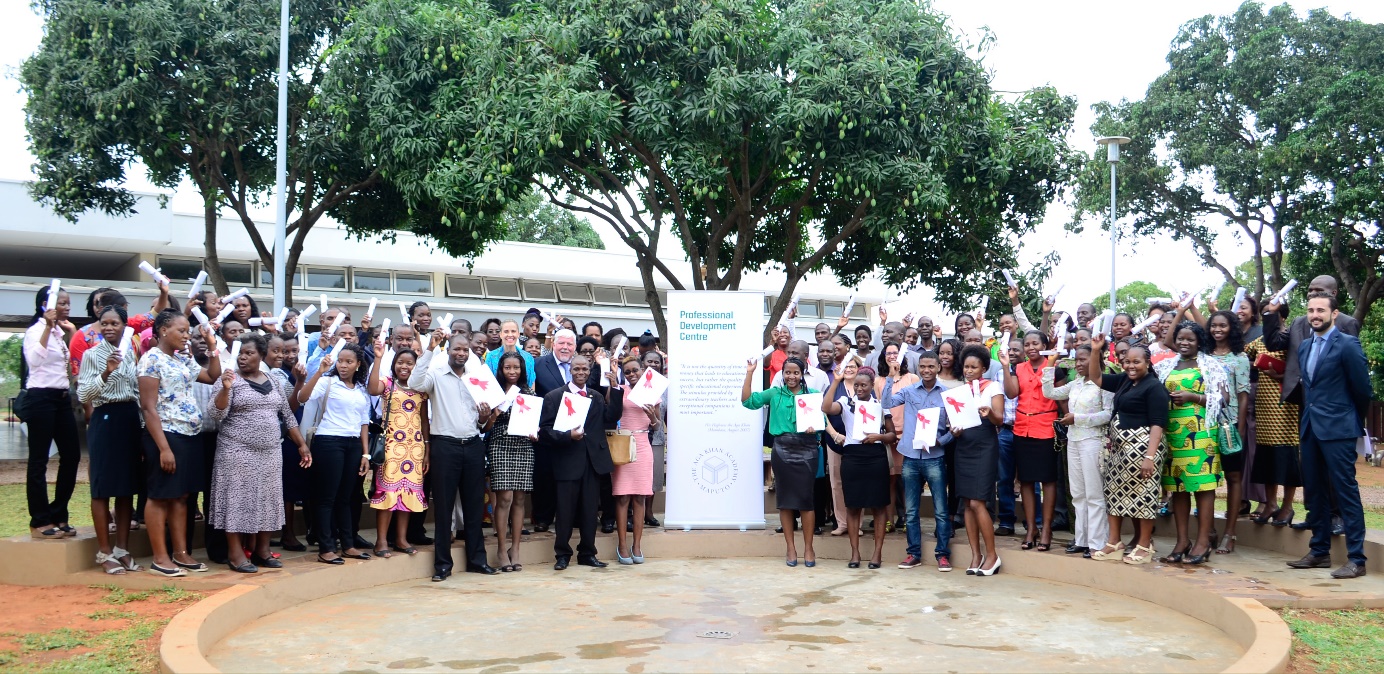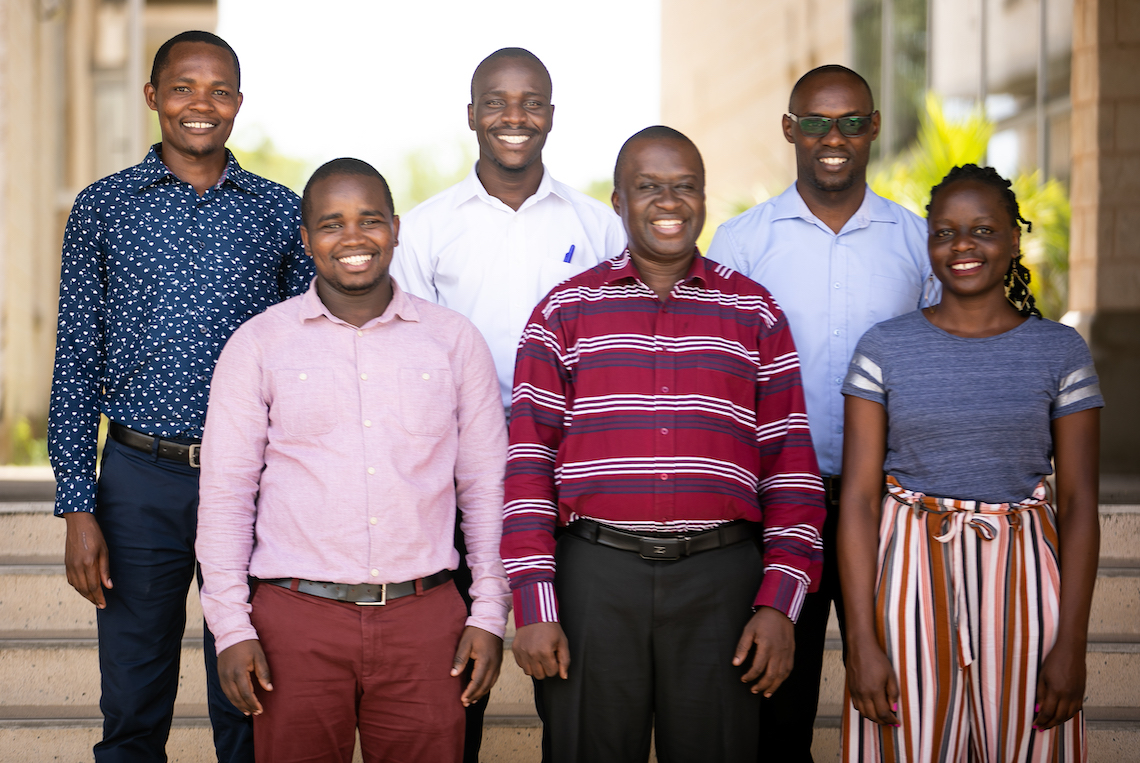Maike Silver: Cultivating Young Minds to Truly Make a Difference
Ask Maike Silver, Junior School Principal at the Aga Khan Academy in Maputo, Mozambique, what attracted her to teach at the Academy.
“The vision and mission of the Academy,” she states simply. “The vision to inspire young people into becoming future leaders of their countries. To actually have the ethical persuasion to make a difference in the lives of their countrymen.”
Originally from Germany, Maike says it was her father’s voluntary work in her hometown that swayed her into the teaching profession. “I was 12 years old when I started helping my dad coach young swimmers at our local hometown club. Ever since then, I have wanted to work with children and young people.”
Starting her teaching career at a German-American International School in California as an Early Years Specialist, Maike worked for 17 years, before embarking on her international educator journey, first to Cebu, Philippines, and then onto Maputo, Mozambique. She started working at AKA Maputo in 2018.
While she applauds the International Baccalaureate (IB) framework the Academy uses to guide teaching and learning, Maike also values the Aga Khan Curricular Strands of ethics, pluralism, economics for development, cultures, governance, and civil society. These play an important role in her instruction.
“It is these added leadership and stewardship attributes that empower students to care for their communities and that also provide a concentrated focus on local issues,” she states with conviction.
One of Maike’s main goals is to create an environment in which learning can be a positive and transformative experience and make a meaningful impact on students. Aware that young people flourish academically and emotionally in a constructive environment, Maike goes to great lengths to demand discipline for behaviours that maintain reverence and a sense of community and family in which every student feels valued. She feels strong peer relationships are important as are mutual trust and respect between students and between students and teachers.
“In order to be a great teacher several factors need to be in place,” Maike says with authority. “The classroom environment needs to be one of mutual respect where teachers and students connect and together create expectations for behaviour that uphold dignity, and a sense of caring for each other and a passion for learning,” she states solemnly.
In her opinion, teaching is one of the hardest and yet one of the most rewarding professions. “Being a teacher is a difficult occupation as it requires a tremendous amount of energy to keep children engaged in their learning as well as show compassion for all categories of different learners. The job entails diplomacy and resilience when dealing with the different demands from parents, students and administrators.”
Aware of the importance of being prepared before teaching a class, Maike states emphatically that a teacher needs to plan activities and strategies with a strong sense of commitment in order to inspire students.
“The teacher needs to plan engaging activities that have a clear sense of purpose and where the outcome can be assessed. At the same time, the teacher needs to be responsive to the needs of students and must be flexible in their planning. This requires a teacher to be open-minded and reflective,” she notes.
If Maike carries a sense of manifest destiny for her students, she credits the Academy’s IB curriculum of a holistic education. Saying it is critical for educators to train students to think critically and creatively, and to be able to transfer their knowledge to real-life situations, she quotes Ernest LeRoy Boyer, who was a distinguished American educator, who once said “To be truly educated, a student must …make connections across the disciplines, discover ways to integrate subjects and ultimately relate what they learn to life."
Maike has savored every moment of being part of the AKA Maputo family. “I feel it is a tremendous honour and responsibility to be part of creating sustainable systems for a newly-developing Academy. I hope to leave behind a legacy of having been a kind, compassionate and effective leader who played an essential part in providing our young leaders of the future with the highest quality of education that prepares them to enact positive change in the world they inhabit.”
Written by Perviz Walji
Laboni Banerjee: cultivating community wherever she goes
Laboni was immediately attracted to AKA Hyderabad because of the vision and mission of His Highness the Aga Khan for the Aga Khan Academies. She found the values of the Academy to be more aligned with her own ethos than the school she was previously working at before joining the Academy.
“Over the course of 10 years at the Academy, I have found myself a part of a vibrant and caring community,” Laboni said.
When joining the Academy in 2010, Laboni recalls it being a much smaller school then, especially the International Baccalaureate (IB) Primary Years Programme (PYP). There were only seven PYP teachers and the Junior School principal at the time, Diana Smith who started the PYP at the Academy, along with Sreelatha Kumar, who was the PYP coordinator at the time and is now the Junior School principal. AKA Hyderabad received the Diploma Programme and Middle Years Programme authorisation in 2012 and 2013, respectively. The latter year is when Laboni remembers seeing notable growth in both students and faculty at the Academy.“Early years in the PYP were busy,” Laboni said. “During this time, I was also focusing on identifying myself as a member of the PYP team and growing with the school.
Over the course of her time at AKA Hyderabad, Laboni has taken on various roles. Along with being a Grade 3 teacher, Laboni took a role in the PYP reading and writing assessment in which she collected evidence and data. Laboni also helped with the Admissions Department and was responsible for checking the vocabulary of students applying to the Academy. Reflecting back, Laboni said she greatly appreciated this role because it allowed her to build a special relationship with parents and students from the very beginning of their Academy journey.
“While working with the Admissions Department I valued meeting a large number of people who were enthusiastic and eager to learn more about the PYP in the early years.”
From 2012–2014 Laboni helped with AKA Hyderabad’s Outreach Teacher Training programme, which is a core part of Academies’ Professional Development Centre (PDC) that trains local teachers around the community in various subject areas and enhances their pedagogical skills.
A few years ago, Laboni also had the opportunity to travel to the Aga Khan Academy in Mombasa, Kenya where she truly began to appreciate the pluralistic approach to education and diverse cultures and backgrounds the Academies values and emphasises. During her time in Mombasa, Laboni met Titus Mutemi, who was a recent graduate of the Teacher Preparation Programme – a programme provided by the Academies that trains teachers to become IB educators in their communities – and is now the PYP coordinator at AKA Mombasa. Laboni recalls Titus being filled with great enthusiasm and eagerness as he wanted to know everything about her class including the assessment techniques, books she has students read, any material created for the class and much more.
“Partnering with Laboni was such an enriching experience,” Titus said. “Her flexibility and open-mindedness made our collaboration easier and enjoyable. Years have gone by and yet her enthusiasm and unique way of engaging with the young learners is still memorable.”When AKA Hyderabad transitioned to online learning in March 2020 due to COVID-19, Laboni said there were a few challenges she faced but was able to overcome due to the support she received from the Academy.
“In the PYP we have always used technology as a learning and teaching tool. However, when we shifted to complete online teaching, building the bridge with new students I had never met before was the biggest challenge. With physical teaching, I was able to bond with my students on a personal level, but this changed with distance learning.
However, the Academy always supported me and made me feel comfortable working on a virtual platform with a new group of learners. Assigning me to be a part of various online professional development sessions was immense support as it helped me develop my understanding of the application of various teaching tools. The virtual learning and teaching also enabled me to look at my own teaching philosophy through a different lens and reimagine my teaching strategies. Now, it is my greatest joy and top priority to see my students online and have personal conversations with them.”Laboni said she cannot imagine her future without the Academy being a part of it. She is always involving herself in different roles throughout the Academy in order to connect with more students beyond the PYP and see how they turn their passions into reality. Laboni also said she is fortunate to be a part of a community that is continuously supportive and where she is encouraged to grow each day as an educator and individual.
“The greatest part about delivering education at the Academy and being a part of its community is that every day is a learning experience for me. I am always excited to see my students become open-minded young adults, chasing their greatest passions in life and thinking about how to make the world a better place for all.”
Jonathon Marsh: Supporting the quality of teaching at the Academies
Jonathon Marsh has system-wide responsibility for teacher development at the Aga Khan Academies network. Having worked for the Academies for the past 10 years, he has previously had leadership roles in education in Canada, Hong Kong, the United Arab Emirates and the United Kingdom, including as the Head of Professional Development and Research for the International Baccalaureate. In this interview, he shares the highlights of his position at the Academies, and reflects on how the Academies are unique from other educational institutions.
Tell us the journey that led you to the Academies.
I first came across the AKDN when I was in Hong Kong. I read a recruitment ad in the Times Higher Education magazine seeking people to fill positions at the then recently opened Aga Khan University in Karachi. I remember looking at the ad and experiencing a strong sense of conviction that one day I would work for this organisation. More than a decade later, while working at the IB, I was introduced to Salim Bhatia [Director of Academies] by the then Chair of the IB’s governing council. Salim asked me if I knew anyone that would be interested in taking a lead role in teacher development for the emerging Academies. At the same time, he was in discussion with Monique Conn, who was my line manager at the IB, about the position of Academic Director. Monique accepted the position soon thereafter and persuaded me to join as well.
What is the most rewarding aspect of working for the Aga Khan Academies?
I think the majority of my colleagues would unanimously reply “the students”, and they would be right to do so. However, for me the job is about quality teaching, and having the opportunity to really influence the discourse on teaching and learning in the countries and regions we work within is very exciting. Having a chance to work both at the high end with government ministries, NGOs and universities and at the chalk face with individual teachers, especially young people new to teaching, provides me with a full spectrum of very meaningful and satisfying engagements.
What led you to choose your particular career?
I don’t see it as a career but rather as a vocation. I see the profession of teaching as critically important to the health and ongoing development of any society. As such, I can think of no better way to contribute to the betterment of humanity.
What attracted you to the Academy?
First and foremost, the vision and mission. Especially attractive is His Highness the Aga Khan’s insight into the importance of the profession of teaching and the need to restore its much diminished status in the various geographies within which the Academies are located.
Reflecting on your time at the Academy, is there a particular day that was especially rewarding and memorable?
There are too many to count. Among them perhaps two stand out: 1) the graduation of the first cohort of teacher interns completing the Teacher Preparation Programme (TPP), and 2) becoming the first (and as yet only) school network in the world to offer a teacher development programme recognised under the IB Educator Certificate initiative. The building of the TPP and overcoming the many associated challenges took an extraordinary amount of effort, with contributions coming from many people. Seeing it come to fruition was very gratifying.
How do you think you contribute to the inner workings of the Academies and to the achievement of its goals?
I work collegially with the Heads and senior staff in each Academy to think through and implement systems to support the quality of teaching across the network. This includes working with both external and internal providers to source and implement professional development programmes; liaising with universities and other AKDN agencies to define and conduct research and development projects; providing support for the collection and analysis of standardised data; ongoing development and application of the Academies’ teacher appraisal programme; specifying career pathways for teachers; and contributing to the specification of the Academies outreach strategy.
What sort of positive impact have the Academies had on you?
I have gained a great deal of knowledge and understanding around what it takes to start up a high quality school. I have also gained a great deal of insight into the full complexity of running a school. I have always had a great deal of admiration for those brave and committed enough to teach, but my admiration has grown considerably for those who continue to do so under very difficult circumstances.
In what ways has the Academy helped you to become a more effective advocate in the education world?
I am nearing the end of my professional life (I am not really sure what that means other than a euphemism for being over 60), and my role in the Academies has provided me with a unique opportunity to apply much of the knowledge and understanding I have gained over the years. I have drawn upon my background in philosophy and spirituality to better ground my efforts to develop systems within His Highness’s vision for the Academies. I have drawn upon my studies in educational technology to inform system development. My time at the IB has helped me to understand the particular needs of IB teachers and how to support them. The years spent in tertiary education have enabled me to better liaise with universities and support research and data collection. Working with the Academies has allowed me to not only to promote principles of good practice and high quality education, it has provided me with a platform to do so in places that are hungry for change and very much in need of educational reform.
How would you describe the teacher development work with which you engage?
I would describe it as very rewarding precisely because it is very challenging. When it comes to teacher development, we are dealing with many layers of readiness among practitioners. Each country has its own approach to teacher preparation, and within each country not all teachers are given equal standing. For example, senior school teachers are typically better trained and better paid than junior school teachers. Junior school teacher preparation often does not involve gaining a university degree, and only those who could not get into a university opt for junior school teacher training programmes. Convincing people that teaching young children is at least as complex and difficult as teaching older kids is surprisingly difficult. Yet how are we supposed to achieve the kinds of sophisticated learning outcomes envisioned by His Highness if we do not prepare students for them right from the beginning? Building the necessary culture of professional respect for the expertise of all teachers, and indeed helping teachers to define and value their own professional identities is particularly important and very challenging.
What do you think sets the Academies apart from other educational institutions?
The Academies are not unique. There are other schools around the world which share many of the same attributes. However, they do have some very interesting defining characteristics. Firstly, the degree to which they are vision and mission led is compelling for many. Secondly, the commitment they have to provide access to excellent education to talented kids regardless of their ability to pay. Thirdly, their commitment to serve the countries they are in by providing an international standard of education for a majority of local students and employing 80% local teachers. Lastly, their rootedness in the local community and their ability to draw upon the many strengths of the wider AKDN as well as the committed and generous support of the Ismaili community.
How do you think the Academies ensure a climate of pluralism?
The Academies strive to value each child and each member of staff as a unique individual, and expect each to make a unique contribution. A pluralistic perspective is promoted by bringing together individuals from across cultural boundaries, tribal lines, disparate geographic locations, genders, ages, faiths, and economic backgrounds and providing them with a continuous and intensive opportunity to engage with, understand, and come to value each other’s “otherness”.
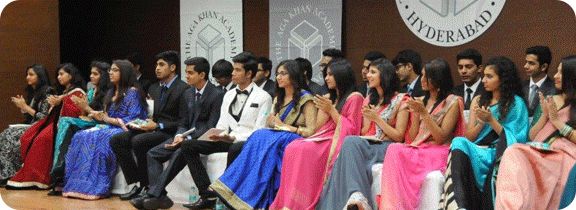
International Baccalaureate
The International Baccalaureate (IB) is a non-profit educational foundation, motivated by its mission to create a better world through education. IB programmes for students aged 3 to 19 help develop their intellectual, personal, emotional and social skills to live, learn and work in a rapidly globalising world.
The Aga Khan Academy Hyderabad has been authorised as an IB World School offering the IB Primary Years, Middle Years and Diploma Programmes.
IB World Schools share a common philosophy – a commitment to improve the teaching and learning of a diverse and inclusive community of students by delivering challenging, high quality programmes of international education that share a powerful vision.
Aims of the IB programme
Founded in 1968, the International Baccalureate currently works with schools in 144 countries to develop and offer their programmes to over one million students.
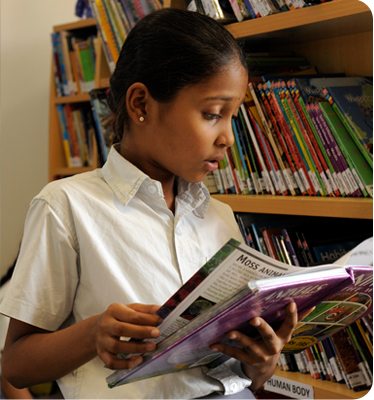 The IB mission statement declares:
The IB mission statement declares:
"The International Baccalaureate aims to develop inquiring, knowledgeable and caring young people who help to create a better and more peaceful world through intercultural understanding and respect. To this end the organisation works with schools, governments and international organisations to develop challenging programmes of international education and rigorous assessment. These programmes encourage students across the world to become active, compassionate and lifelong learners who understand that other people, with their differences, can also be right."
Primary Years Programme
The Primary Years Programme (PYP) at the Academy, for students aged 6–10, focuses on the development of the whole child, addressing social, physical, emotional and cultural needs, while giving students a strong foundation in all of the major areas of knowledge. Through the PYP, children become aware of and sensitive to the points of view of people in other parts of the world.
Middle Years Programme
The Middle Years Programme (MYP), for students aged 11–16, integrates the study of all the major disciplines, including languages, sciences, literature and the social sciences, mathematics, arts, technology and physical education. The MYP normally includes a service component designed to encourage students to become involved with their communities.
Diploma Programme
The Diploma Programme (DP), for students aged 16–19, is a two-year course of study that prepares students for university. All DP students study languages, a social science, an experimental science, mathematics and, usually, an arts subject.
At the same time as it provides a form of academic passport, the DP generally fulfils the requirements of a student's national education system. Each student's performance is evaluated by independent examiners and measured by his or her levels of knowledge and skills relative to set standards applied to all schools.
For further information about the International Baccalaureate and its programmes, please visit the IB website.
IB Teacher Education Welcomes Aga Khan Academy Teacher Interns
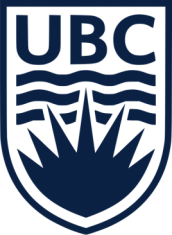
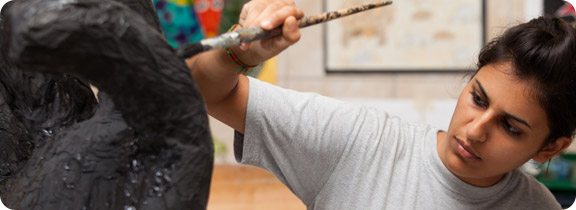
Partnerships
Each Aga Khan Academy benefits from the combined experience of the network of Academies as well as from partnerships with other global networks and institutions. These linkages enable the development and support of world-class standards of excellence.
Aga Khan Development Network
The Aga Khan Academies are one of the key education programmes of the Aga Khan Development Network (AKDN), whose institutions are engaged in a wide array of development initiatives.
AKDN draws on over a century of experience in education from pre-primary to tertiary levels, and includes more than 240 schools and two universities. Students and faculty at each Aga Khan Academy are able to access the intellectual and programmatic resources of AKDN institutions, including the Aga Khan University, the University of Central Asia, the Aga Khan Education Services, the Aga Khan Foundation and the Aga Khan Trust for Culture. The Academies also work in close partnership with AKDN institutions and programmes around the world to provide practical experience opportunities through internships for students and alumni.
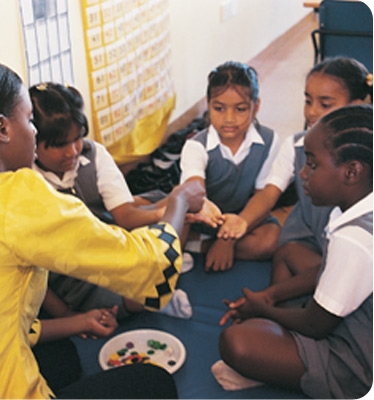
Other leading institutions
The Aga Khan Academies have established formal partnerships with governments, universities and other leading organisations to ensure high standards of practice and foster innovation. Some of the areas that Academies’ partnerships support include best practices in teaching and learning, innovative approaches to teacher education, development of quality campus facilities, supplementary education opportunities for students and access to higher education for talented Academies graduates in need. The Academies have also established partnerships with Ministries and Departments of Education to help strengthen education provision in the countries where our schools are located. Current partners include:
Agencies of the Aga Khan Development Network | International Baccalaureate | Government of Ontario, Canada | Agence Française de Développement | The University of British Columbia Concordia University | California State University, Northridge | Ryerson University | Ministry of Education, Science and Technology, Kenya | Ministry of Education and Human Development, Mozambique | Department of School Education, Telangana, India
In addition, the Academies collaborate with a number of schools and other organisations locally and internationally in areas of mutual interest and to share knowledge and experience.
The IB network
AKDN has a formalised relationship with the International Baccalaureate (IB) through a Memorandum of Understanding between the two organisations.
As IB World Schools, the Academies are closely linked to a network of dynamic IB institutions in over 125 countries, united by a common vision for education and global standards. Guided and facilitated by the IB, this network uses face-to-face conferences and workshops as well as technology to enable teachers and school leaders to gain from each other's experience and to share projects and initiatives.
Ensuring world-class standards
Being connected to these global networks and institutions enables the Academies to test and validate their standards of excellence. These partnerships contribute to the quality of the curriculum and professional development programmes, and ensure that the Academies maintain and enhance their high international standing.
Videos
The Aga Khan Academy Maputo is committed to developing future leaders by delivering Excellence in Education. We offer merit-based admission to our International Baccalaureate (IB) programme at our purpose-built world-class campus in Maputo, Mozambique. Watch our newly released video to learn more about our unique offering.
The International Baccalaureate featured the Aga Khan Academies and our approach to creating home-grown leaders as part of their 50th anniversary commemoration. Watch to learn how the Academies work to transform the communities in which they are located.
This is Abdirahman, a student at the Aga Khan Academy Mombasa. During his time at the Academy, he explored his wide-ranging abilities and developed an initiative that helped change the lives of young girls in Mombasa.
Meet Abdalla, a Somali student from the Aga Khan Academy Mombasa. He shares his journey of self-discovery: Abdalla solidified his multiple identities, fostered his strengths, and created positive social change during his years at the Academy.
Women and girls are strong, fearless, courageous, limitless, and powerful. The Aga Khan Academy Hyderabad celebrated International Women's Day on 8 March 2018 with this video.
Video by AFD – Agence Française de Développement about how children at the Aga Khan Academy Maputo "Dare to Dream Big" in their new school facilities. The Aga Khan Academy in Maputo, Mozambique has been growing since it opened its doors in 2013. The second phase extension was completed in early 2018 and included bigger classrooms, extended outdoor play areas, a library, an art room and a science lab.
This is Mercy, a teacher at the Aga Khan Academy Mombasa who joined through the Teacher Preparation Programme. Mercy fosters profound and meaningful relationships with everyone around her and consistently encourages her students to be the best versions of themselves.
Meet Sadiq, a student at the Aga Khan Academy Mombasa. Open-mindedness, confidence and time management are some of the many characteristics he has developed at the Academy that will help him achieve his dream of becoming a journalist.
Meet Saumya, a student at the Aga Khan Academy Mombasa. A musician and a leader, she shares her wisdom on what it means to make a true positive impact.
Introducing Ivy, a student at the Aga Khan Academy Mombasa. Her innate drive for self-growth and desire to give back to the community makes her a true home-grown leader.
Meet Felix, a student at the Aga Khan Academy Mombasa. With a keen early interest in science, he shares his dreams for the future and explains how the Academies have helped foster his ambitions.
This is Stephen, a student at the Aga Khan Academy Mombasa. His passion for community service shines as he expresses the growth in perspective he experienced through his education at the Academy.
A day at the Aga Khan Academy Mombasa's Junior School, seen through the eyes of the students.
Students and teachers from the Aga Khan Academy Hyderabad are featured in this film from the International Baccalaureate about the Middle Years Programme.
This film by the International Baccalaureate highlights the impact being made by students from the Aga Khan Academy Hyderabad through a service initiative at a local government school.
July 2017 video showing progress on the construction of the Aga Khan Academy Maputo's campus.
The aim of the Aga Khan Academies is to develop future leaders with the skills and knowledge to support positive development in their societies. The Academies achieve this by recruiting exceptional young people from all backgrounds and providing them with the highest international standard of education.
The Aga Khan Academies are a global network of schools that produce future leaders who are ethical, effective and pluralistic.
